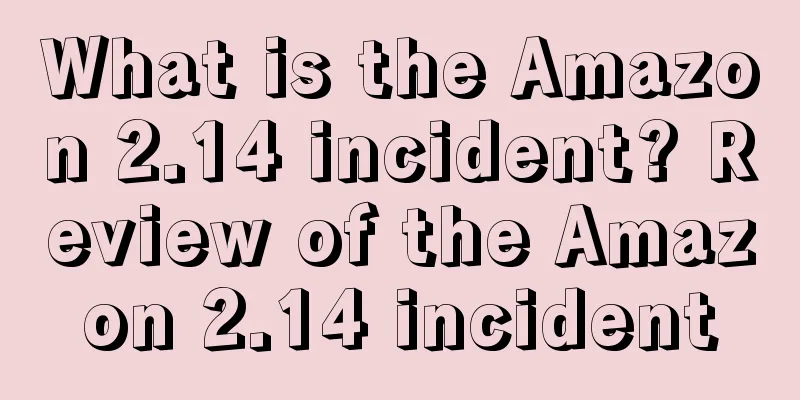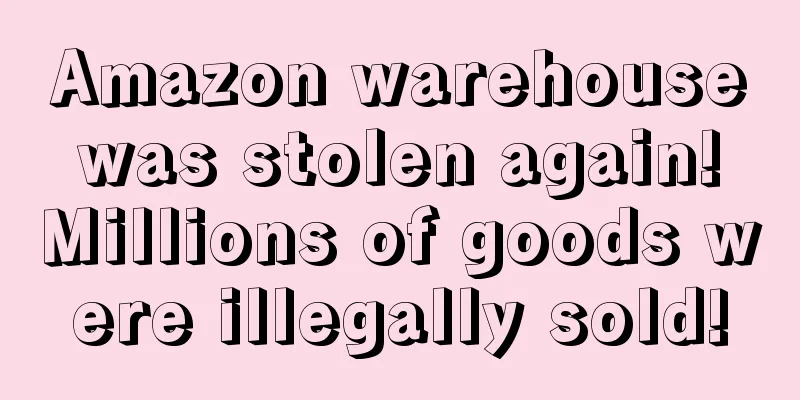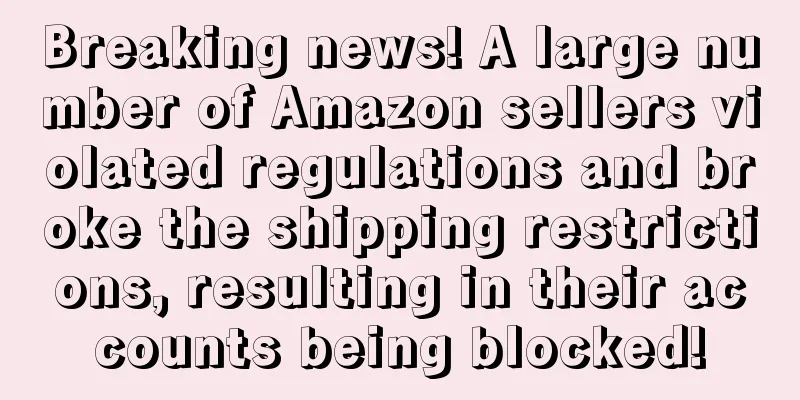What is the Amazon 2.14 incident? Review of the Amazon 2.14 incident

|
The Amazon 2.14 incident refers to the fact that Amazon blocked a large number of seller accounts on Valentine's Day (2.14) and New Year's Eve in 2018, deducted payments and goods, and the ban was unprecedented in intensity, mainly targeting sellers who faked orders (fraud). Event Review On February 14, 2018, Amazon banned all sellers who had engaged in "fake orders" without warning. The main features of this ban are: the account cannot be logged in, and it is still impossible to log in by "recovering the password". On March 2, 2018, a seller reported that he received an email at around 8 a.m. and followed the instructions in the email to log in to the seller backend. After changing the password, he was able to log in normally. Sellers who have their accounts back must submit an "appeal plan" within 17 days for review by the Amazon platform, and the review period is about 90 days. On March 6, 2018, sellers protested at the door of an Amazon warehouse in Guangzhou, China: Give me back my hard-earned money! Seller response “No matter what Amazon sellers did, at least Amazon should give the sellers an explanation, instead of just confiscating the outstanding payments like a robber! This is unethical and illegal! We have contacted at least 500 sellers who were treated this way. The lowest estimated loss is more than 100 million US dollars. It is said that there are tens of thousands of sellers who have suffered losses this time. We have nowhere to appeal.” It also sparked a topic on Weibo: "Amazon's black-hearted platform has banned a large number of Chinese sellers for no reason." As of now, it has been read 321,000 times. Amazon responds Amazon is committed to continuous innovation to enhance and protect consumers' shopping experience and create a fair, healthy and sustainable business environment for sellers around the world. Sellers must comply with relevant policies when selling goods on Amazon. Any seller who violates Amazon's policies may be disqualified from selling, have their account suspended, have their funds withheld, or even be held legally liable, depending on the severity of their behavior. If sellers have any questions about their accounts, please contact Amazon's seller support team or account manager, and we will investigate and verify and take appropriate measures. Seller Alert 1. Fight for your rights rationally In the face of this incident, the sellers’ interests have suffered considerable losses, but do not let anger overshadow your rationality. Try to fight for your rights and interests in a non-violent, reasonable and legal way. You can seek help from relevant institutions, associations, etc. 2. Be familiar with platform policies and regulate your own behavior For sellers, no matter how the platform changes, being familiar with the platform’s policies is the basis for gaining a foothold on the platform. Although Amazon will block accounts, sellers should still regulate their own behavior to reduce the possibility of being "accidentally injured." 3. Find a new platform solution Don't rely on one tree, invest in multiple platforms and spread the risk. How to ensure the health and security of your account 1. Product quality and operation inspection Start your account health review by checking the quality of your products. This step will naturally lead to a comprehensive review of your business operations. Specifically start from the following aspects: 1. Listings; 2. Documentation; 3. Operation/training; 4. Customer service; 5. Product handling and packaging; 6. Product procurement. 2. Seller Performance Indicators and Buyer Feedback Amazon has set up multiple seller performance indicators to evaluate sellers’ performance, including order defect rate (ODR), A-to-z claims, and refunds. You need to understand the potential dissatisfaction of buyers from each indicator. Discovering these problems early will ensure that you have enough time to make adjustments and avoid bad indicator data from damaging your account health. 1. Review the buyer’s reasons for return; 2. Gain in-depth understanding of the ASINs marked by Amazon; 3. Fully understand buyer feedback. 3. Dealing with Anti-competitive Behavior of Competitive Sellers Fake reviews Buying fake reviews for competitors is one of the ways bad sellers attack their competitors. They may buy negative reviews for you or a large number of positive reviews for you. The former will damage your seller index, while the latter will cause you to be investigated by Amazon and even cause Amazon to suspend your seller account. Therefore, once you find a large number of unidentified reviews in your listing, you must deal with them in a timely manner. From the day the bad operator leaves the review, you need to ask Amazon to delete the fake review within 90 days. 4. Sellers need to make Amazon feel their sincerity Apply for ASIN reinstatement "Amazon has deprived me of the ability to sell my best-selling product. What should I do?" Have you ever encountered such a problem? When you encounter such a problem, first you need to know the reason why Amazon did so, such as your product has a huge problem that caused a lot of customer dissatisfaction. After understanding the reasons, you need to list them and develop corresponding detailed solutions and future preventive measures. Pay attention to writing these contents in a report in the form of bullet points. The length should not be less than one and a half pages, and submit it together when submitting the POA appeal letter to Amazon. This is the fastest way for sellers to restore their ASINs, because Amazon will feel your sincerity. 5. Sales that infringe on property rights are not advisable Hot-selling products often have their own exclusive property rights. If novice sellers blindly follow the sales, it is easy to cause the store to be closed due to infringement. If sellers sell related products on Amazon without authorization and are detected by the official, the result will be that the store will be removed from the shelves and closed. 6. Anti-correlation When novice sellers are performing account-prevention operations, they must remember a key word, which is brand new. Each of your accounts requires brand new information, a brand new network environment, and brand new operating equipment. Once one of the elements is not brand new, then the registered accounts are likely to be linked. 7. Amazon account security is more important than sales, and steady operation is the most appropriate The goal of Amazon sellers is to increase sales in their stores. Sales indicators are affected by various factors, and sellers need to jointly optimize operations to steadily increase and maintain sales. 8. VAT Invoice If a business buyer makes a purchase on Amazon, the seller must send an electronic invoice or receipt after shipment confirmation. Even if no tax is required, the seller still needs to provide a receipt for each business order. 9. Inventory barcode Amazon stipulates that all product packaging delivered to Amazon warehouses must be affixed with Amazon barcodes. Products with other barcodes will be restricted from entering the warehouse. Products that entered the warehouse before this policy is not affected. Therefore, if sellers need to replenish or enter the warehouse later, they can choose to affix the barcodes themselves, or pay Amazon to help affix them, and check that every product entering the warehouse has the Amazon barcode accurately affixed. |
<<: What are Amazon reviews? Amazon reviews
>>: What is Algeria COC certification? Algeria COC certification review
Recommend
What is Mizzen+Main? Mizzen+Main Review
Mizzen+Main was founded in 2012. It is an American...
What is Pandao.ru? Pandao.ru Review
Pandao.ru is a cross-border e-commerce platform un...
29 ways to open a case on Amazon
4. Feeds/Template Issues If you have a Bach ID Ge...
What is Shopkeeper? Shopkeeper Review
Shopkeeper is a profit dashboard that tracks sales...
20 common problems that new Amazon users often encounter when registering an account
Some common sense questions that novice sellers o...
This generation of consumers will buy even if the price goes up! US retail sales surged by $10.7 billion in October
It is learned that according to foreign media repo...
Competitor Research: How to Monitor Your Competitors’ Facebook and Instagram Ads
Dear sellers, when you are running ads, have you ...
Will Amazon Europe also need to purchase insurance in the future? Amazon Canada and Europe’s official latest insurance requirements policy (May 29, 2024)
GOTOGOON My C position I received a reminder from ...
What is Cross-border Cloud Classroom? Cross-border Cloud Classroom Review
Cross-border Cloud Classroom is an online learning...
Is Black Friday sales in the US all about price increases? How much is the real demand?
It is learned that due to macroeconomic pressures ...
What is Meubles.fr? Meubles.fr Review
Meubles.fr is a leading shopping engine in France ...
How can a beginner do cross-border e-commerce? Eight core points will help you win the market!
To start cross-border e-commerce, you must go thro...
Aldi recalls pet calendars due to choking hazard! Amazon may be selling them!
It is learned that on January 4, the U.S. Food and...
The “Ten Don’ts” for Optimizing Amazon Listings
For Amazon sellers, the dream every day is to have...
What is EBANX? EBANX Review
EBANX is a local cross-border payment solution ser...









